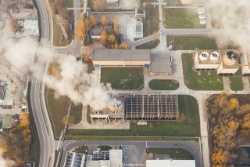Firstcheck skin cancer app partners with Insurance company
Following new Australasian published research that the vast majority of melanomas are self-detected in the home, a new partnership is embracing a new way to tackle our high rates of skin cancer.
Across the ditch, a leading Australian life insurance specialist, TAL, has partnered with Firstcheck this summer to empower all Australians to access skin check expertise from home via a smartphone.
The study showed that 85.4% of melanomas were selfdetected by the patient - or by a family or friend (62.7% and 22.7%, respectively). Doctors first detected only 14.6% of all melanomas.
These findings highlight the opportunities for health technologies available in the home to help address our unenviable skin cancer statistics.
The Firstcheck App and Firstcheck SkinScope (specialised smartphone lens attachment) allow users to send photos of skin spots and moles directly to a skin cancer doctor for assessment, making for a convenient and affordable way to get suspicious spots checked.
The partnership comes as a big boost to the New Zealand health technology company and comes after achieving significant clinical backing through a partnership with Skin Institute, recognized experts in skin cancer and dermatology with 18 clinics throughout New Zealand.
New research from TAL has also revealed that, despite the fact that two in three Australians are expected to be diagnosed with some form of skin cancer during their lifetime , the majority of people (64%) have either never had a professional skin check or not had a professional skin check within the past 12 months .
TAL General Manager, Health Services, Dr Sally Phillips, said: “Current skin cancer screening guidelines expect Australians to get to know their own skin and to consult a doctor about new, changing or abnormal lesions.
“Patients play a critically important role in the detection of skin cancer – and are effectively the ‘first line of defence’ against this disease.”
Firstcheck’s Founder and CEO, Hayden Laird, says “If we look at how the majority of people are currently getting skin checks , it involves the patient showing a spot to their GP to see if it’s something that needs treatment.”
“This is effectively patient-led skin screening and there’s a huge opportunity to support and enhance this practice by making diagnostic expertise more widely accessible by giving everyone access to skin cancer experts online.”
Laird also says that
‘patient delay’ (the amount of time it takes for
patients to seek medical advice about suspicious skin
lesions) is far too long and that it is the key determinant
of the health outcome.


 Commerce Commission: ComCom Warns Of Pyramid Schemes After South Auckland Scammers Plead Guilty
Commerce Commission: ComCom Warns Of Pyramid Schemes After South Auckland Scammers Plead Guilty MBIE: MBIE Publish Mid-Point Review Of The Phase-Out Of The Low Fixed Charge (LFC)
MBIE: MBIE Publish Mid-Point Review Of The Phase-Out Of The Low Fixed Charge (LFC) Science Media Centre: Company Claims To Have “De-Extincted” The Dire Wolf – Expert Reaction
Science Media Centre: Company Claims To Have “De-Extincted” The Dire Wolf – Expert Reaction Stats NZ: Greenhouse Gas Emissions Fall 2.0 Percent In The December 2024 Quarter
Stats NZ: Greenhouse Gas Emissions Fall 2.0 Percent In The December 2024 Quarter The Reserve Bank of New Zealand: Christian Hawkesby Appointed As Governor Of The RBNZ
The Reserve Bank of New Zealand: Christian Hawkesby Appointed As Governor Of The RBNZ Kiwi Economics: It’s Mayhem In Markets As Downside Risks Dominate Following Trump’s Tariffs
Kiwi Economics: It’s Mayhem In Markets As Downside Risks Dominate Following Trump’s Tariffs



